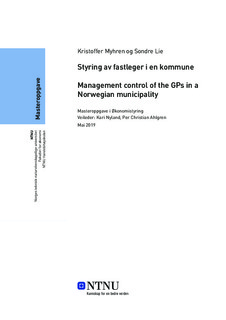| dc.description.abstract | Denne masteroppgaven er en casestudie som tar for seg fastlegeordningen i Trondheim kommune. Formålet med studien er å beskrive hvordan en kommune styrer fastlegene, hvilke mekanismer som benyttes og hvordan mekanismene kan kategoriseres etter vårt teoretiske fundament. Bakgrunnen for oppgaven er dagens situasjon hvor man har en fastlegeordning under press og flere kommuner opplever rekrutteringssvikt og overarbeidede fastleger. For å kartlegge styringen av fastlegene benyttes problemstillingen:
«Hvilke styringsmekanismer benytter en kommune i sin styring av fastlegene?»
Forskningsdesignet i studien er kvalitativt, hvor det empiriske grunnlaget er hentet inn ved bruk av dybdeintervjuer, en observasjon og dokumentstudier. Studien har representanter fra både kommunens administrasjon og fastlegene. Totalt ble det gjennomført et pilotintervju, åtte dybde-intervjuer og en observasjon.
Funnene i studiet viser at styringen av fastlegene i en kommune består av en kombinasjon av Hopwoods (1974) tre styringsformer. Kommunen benytter i stor grad administrativ styring, men den administrative styringen støttes opp av både sosial styring og selvstyring. Studien har kartlagt fire sentrale administrative styringsmekanismer; nasjonale retningslinjer, temaplan, samarbeid og rekruttering. For å støtte opp under den administrative styringen avdekker studien at kommunen benytter seg av profesjonsstyring. Fastlegene får dermed selvstyring gjennom den autonomien som legges til rette for at fastlegene kan løse sine arbeidsoppgaver basert på sin kompetanse og ferdigheter. Studien kartlegger også at kommunen legger til rette for sosial styring og selvstyring, gjennom kompetansetillit, goodwill-tillit, institusjonell tillit og kalkulert tillit. Både kompetansetillit og goodwill-tillit understøttes gjennom kommunens grundige rekrutterings-prosess. Nasjonale lover og retningslinjer fungerer som administrative styringsmekanismer og oppfattes som et viktig grunnlag for den institusjonelle tilliten mellom kommunen og fastlegene. | |
| dc.description.abstract | This master's thesis is a case study based on the regular general practitioners (RGP) scheme in Trondheim municipality. The purpose of the project is to describe how a large municipality controls the RGPs, which control mechanisms are used and how the mechanisms can be categorized according to the Hopwoods (1974) framework. The context of the thesis is the current situation where the RGP scheme is under pressure, and several municipalities experience recruitment failure and overworked GPs. In order to map the management of the GPs, the issue in matter is:
"What kind of control mechanisms does a municipality use in managing their GPs?"
The research design of the thesis is qualitative, where the empirical data are collected by using in-depth interviews, observation and document study. The study has representatives from both the municipal administration and the RGPs. In total, a pilot interview, eight in-depth interviews and one observation were conducted.
The findings of the study show that the management of the GPs in a big Norwegian municipality consists of a combination of Hopwood's (1974) three forms of control. The municipality mainly uses administrative control, but both social control and self-control support the administrative control. The study has identified four essential administrative mechanisms; national laws and regulations, strategy plan, collaboration, and recruitment. In order to support the administrative control, the study reveals that the municipality makes use of professional control. The RGPs thus receive self-control through the autonomy that is facilitated for the RGPs to solve their work tasks based on their expertise and skills. The study also charts that the municipality uses social control and self-control, through competence trust, goodwill trust, and institutional trust. Both competence and goodwill trust are ensured through the municipality's thorough recruitment process. National laws and regulations that act as administrative control mechanisms and are perceived as an important basis for institutional trust for both the municipality and the RGPs. | |
